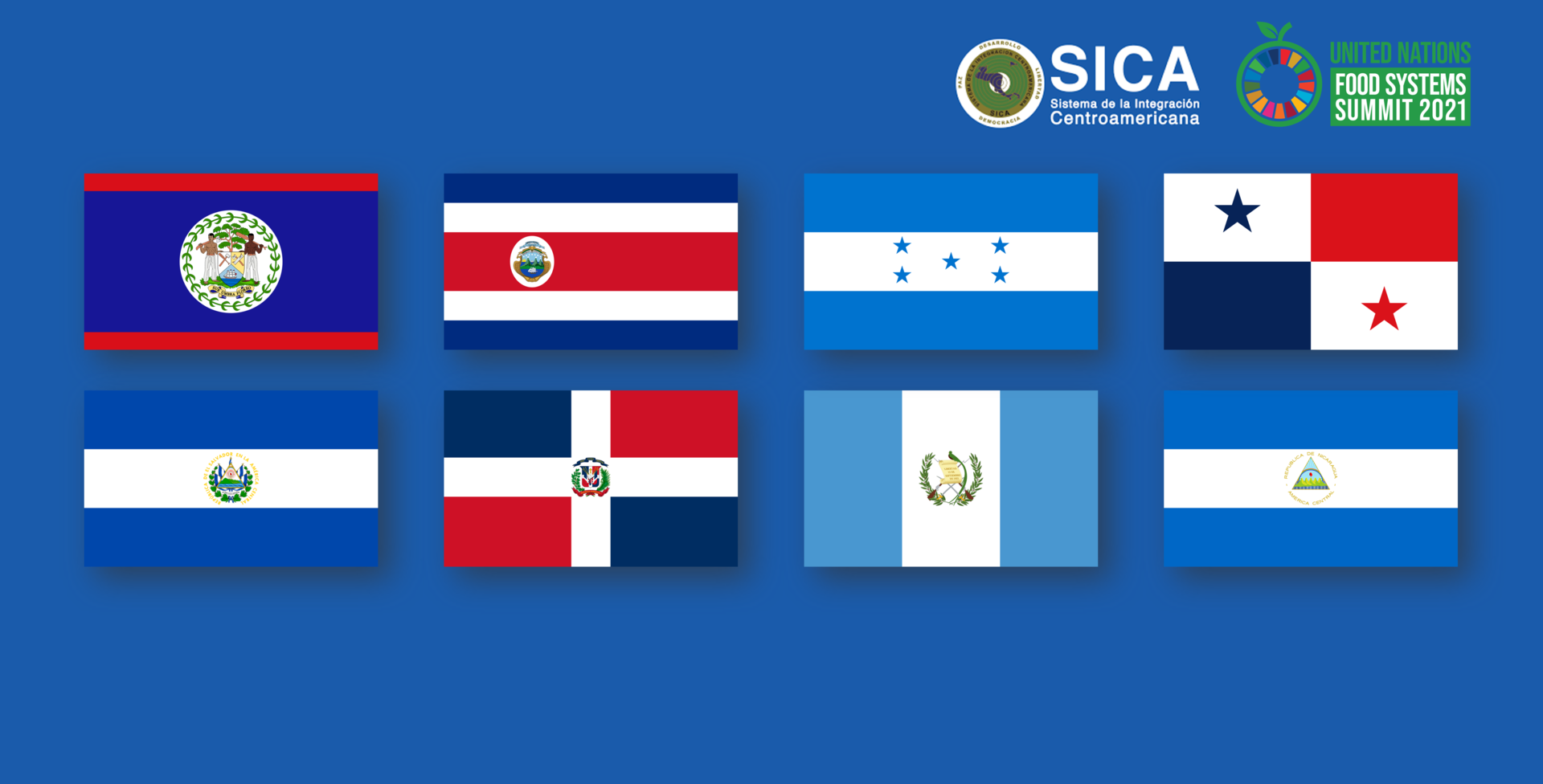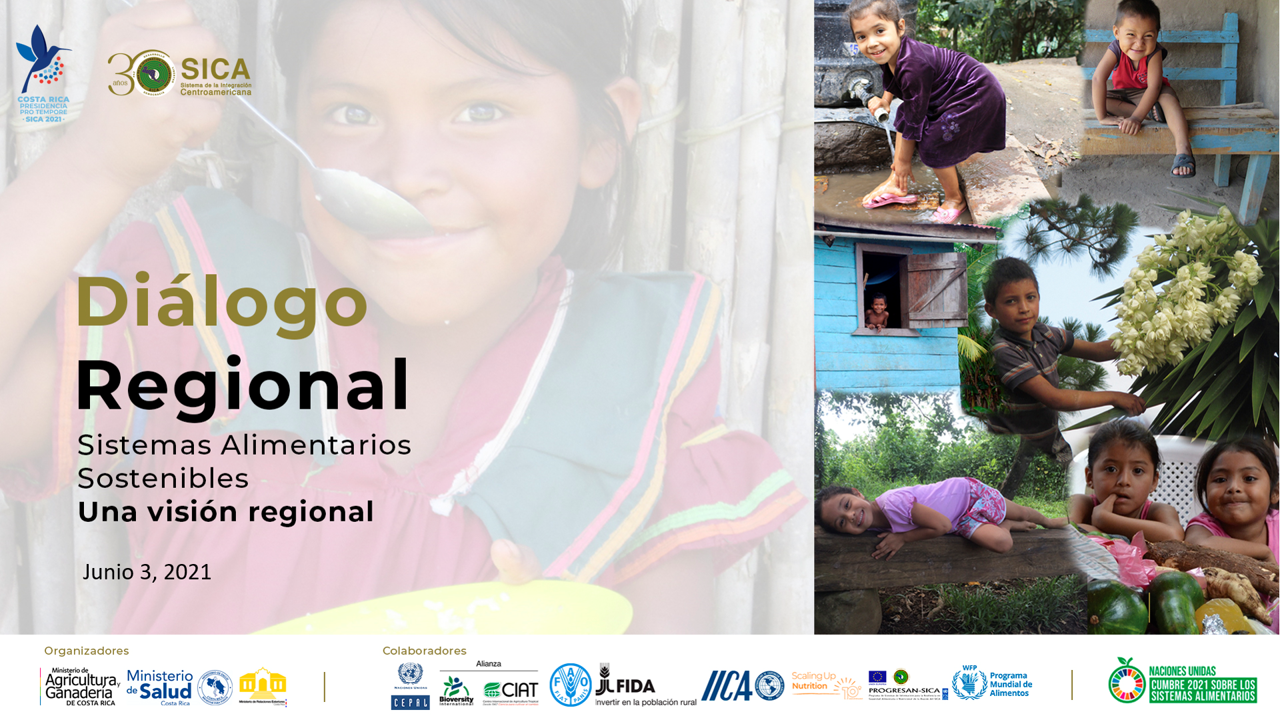My First Dialogue on the Path to the 2021 Food Systems Summit

By Erika Eliana Mosquera
I had heard about the Food Systems Summit, the major event the United Nations is promoting for this year. I knew they were promoting multi-stakeholder dialogues in different countries and regions of the world in preparation for the Summit, and I had even helped prepare materials to promote such dialogues in Honduras, Ethiopia, and Bangladesh. But taking part in a live dialogue was something else--there is nothing like first hand experience!
Last month, I had the opportunity to take notes for the dialogue Sustainable Food Systems: A regional view, convened by the Government of Costa Rica as pro tempore Chair of the Central American Integration System (SICA), in which representatives of the food systems from Belize, Guatemala, Honduras, El Salvador, Nicaragua, Costa Rica, Panama, and the Dominican Republic participated. As a support group for the Chair led by the Food and Nutritional Security Resilience Information System Program of the SICA region (PROGRESAN-SICA), international organizations, including the Alliance of Bioversity-CIAT, ECLAC, FAO, the International Fund for Agricultural Development (IFAD), the Inter-American Institute for Cooperation on Agriculture (IICA), the SUN Movement, and the World Food Programme (WFP), helped in designing the dialogue, facilitating discussion groups, and in drafting the report for the Summit. Since August 2020, we have provided support for food system dialogues, including the “Dialogue on Food Systems and COVID-19 in Colombia“, an independent dialogue with Bayer Crop Science for Latin America, and several national and sub-national dialogues in Honduras and Ethiopia. These dialogues were based in part on the analysis of food systems by the Sustainable Food System National Profiles for Low- and Middle-income Countries project, in which workshops were held with public and private stakeholders from the Honduran food system, who contributed to secondary data collection, result validation and feedback, and helped in the preparation of key messages around the food system.
The Training Session
In order to participate as a notetaker, I needed to receive a 2-hour training session offered by the Summit organizers. I had never read anything about the training sessions before, so I was not sure what to expect, but I was very encouraged by what I found. I would have liked to learn even more from the experience of the facilitators, who openly shared their extensive knowledge, including David Nabarro, special envoy on COVID-19 from the World Health Organization. He joined us throughout the training and shared his strategies to get the most out of the dialogues.
It is clear that the organizers aim to promote an open dialogue and listen to the different voices involved in food systems. Is this a major challenge? Definitely yes. Will they be able to meet it to the extent required? Probably not. But according to my experience in this training session and the subsequent dialogue, I do believe that progress can be made towards better outcomes.
Of course, the multi-stakeholder platforms and the dialogues themselves are not new, nor are the challenges facing our food systems – which were already in crisis before the pandemic – but there was something that did seem novel to me (at least in this context), which I noticed many times in both the training and the Dialogue: the importance being given to people's emotions during the discussions. In fact, the recommendation was to pay more attention to the emotions and perceptions expressed by participants during the debates (including discrepancies and conflicts), and not focus solely on recording an exhaustive list of ideas.

The Dialogue
During the Dialogue, ten discussion groups were formed, and I was in the first group. Half of the groups were assigned the topic, Grant access to healthy and nutritious food for all, and the other five groups discussed Resilience to vulnerabilities, shocks and stresses. I was pleased to find myself in the same group with representatives of:
- Civil society: the Costa Rican Gastronomic Foundation (FUCOGA), which takes part in the SUN (Scaling Up Nutrition) Movement.
- Academia: Central University, Costa Rica, with experience working with indigenous and Afro-descendant communities.
- The scientific community: ILSI (International Life Science Institute) Mesoamerica
- The United Nations Economic Commission for Latin America and the Caribbean (ECLAC)
Actions suggested by the discussion groups to be prioritized in the subsequent years included:
- Recognizing the solutions that lie in the native culture of communities (indigenous, Afro-descendant). Systematize, for example, ancestral agricultural production practices, which encompass conservation techniques and long term benefits. The use of endemic plants by recuperating traditional cuisine is another path to be explored.
- Strengthening, improving, and continuing to work on interregional trade. Harmonization of protocols and standards to ensure interrupted access to food in times of emergency.
- Encouraging family farming with sustainable practices and focusing on the market. Over 60% of food consumed originates from family farming. Healthy soils must be prioritized, by encouraging sustainable agricultural practices, transiting towards organic production and utilizing neglected and underutilized species (NUS), all the while focusing on the market.
- Creating an emergency fund to quickly restore the functioning of the food system in crises.
- Investing in consumer education around food, to facilitate informed decisions.
- Promoting better management of emotions. A collaborative effort is necessary to facilitate broader community participation and ownership, so that solutions do not feel imposed.
- Working to develop skills necessary for effective networking (ie. empathy, trustworthiness, communication, resilience, and patience). Examples of barriers that hinder effective inter-dimensional and multi-sectoral dialogue include the failure to re-examine our visions, the use of rhetorical language not reflected in actions, competition, territoriality and not owning our mistakes or recognizing lessons learned.
- Collaborating with initiatives and structures already in existence, such as interregional groups and communities of practice. The Climate Change and Integrated Risk Management Technical Group from the Central American Agricultural Council has established a technical agenda to collaborate between countries, based on the Climate-smart Agriculture Strategy approved by the Council of Ministers.
- Investing in scientific research to promote new crops, agricultural practices, and strategies in the face of environmental changes. The academic sector has great potential to generate evidence from a regional perspective and to facilitate information sharing.
My favorite phrases from this Dialogue:
“The dialogue emphasizes the interdependence of countries in the region, in terms of food and nutritional security. It also highlights the potential of the institutions that make up the Central American Integration System as an important asset to articulate strategies, policies and common standards to take concerted and coherent actions for more efficient and sustainable food systems in the region. This ensures access to safe and nutritious food for everyone at all times.” Álvaro José Herdocia, Information Systems and Analysis Specialist, PROGRESAN-SICA.
“The dialogues allow for greater flexibility in the points of view of different sectors of society, and this should become a continuous process”. Discussion group taking part in the Dialogue.
“No one is safe until we all are. Especially when we are talking about such interconnected neighbors as we see in this region”, Vinicio Cerezo, Secretary General at SICA.
“We demand that our farmers provide us with nutritious, safe, available, and affordable food, but we no longer consider how to find a sustainable way for them to do it, in economic terms”, Luis Renato Alvarado Rivera, Minister of Agriculture and Livestock of Costa Rica.
“We must decide: if we want to go fast, we must go alone; and if we want to go far, we must go together. We need to learn from one another. Please try to go far, and please make the journey together”, Gerda Verburg, Coordinator of the Scaling Up Nutrition (SUN) Movement.
“Both the pandemic and natural disasters in the region allow us to clearly visualize the need for policies, agreements, and regional actions to recognize interdependence in terms of food movement across countries”, Jennifer Wiegel, group facilitator in the SICA dialogue and and Americas lead for the Food Environment and Consumer Behavior Research Area at the Alliance of Bioversity-CIAT.

